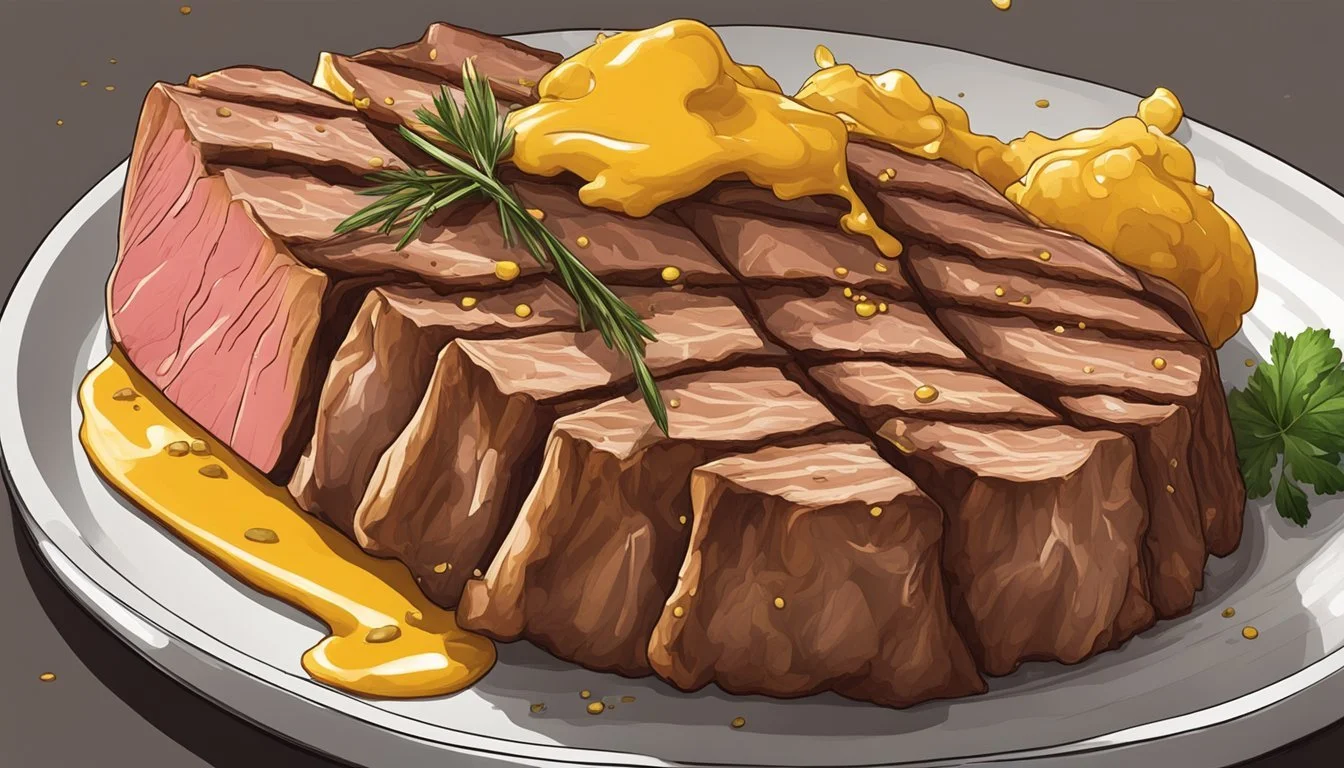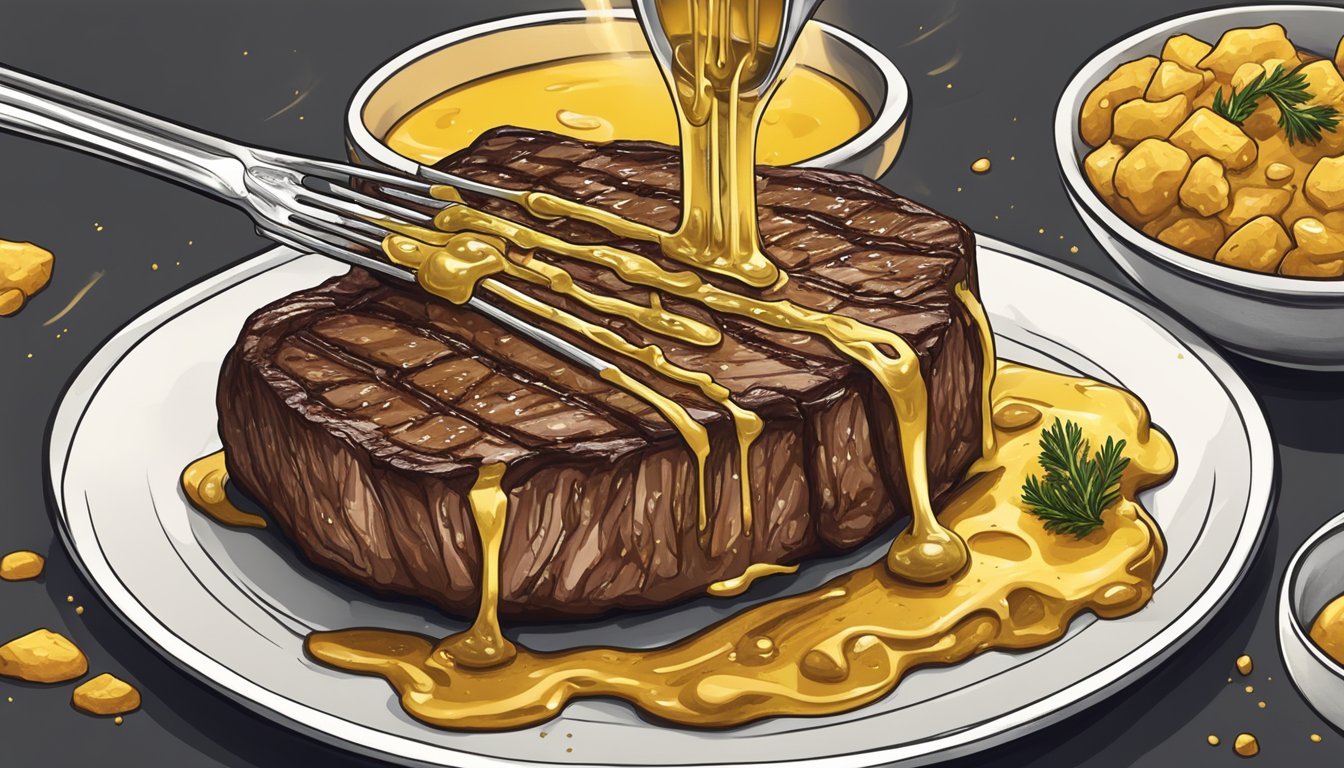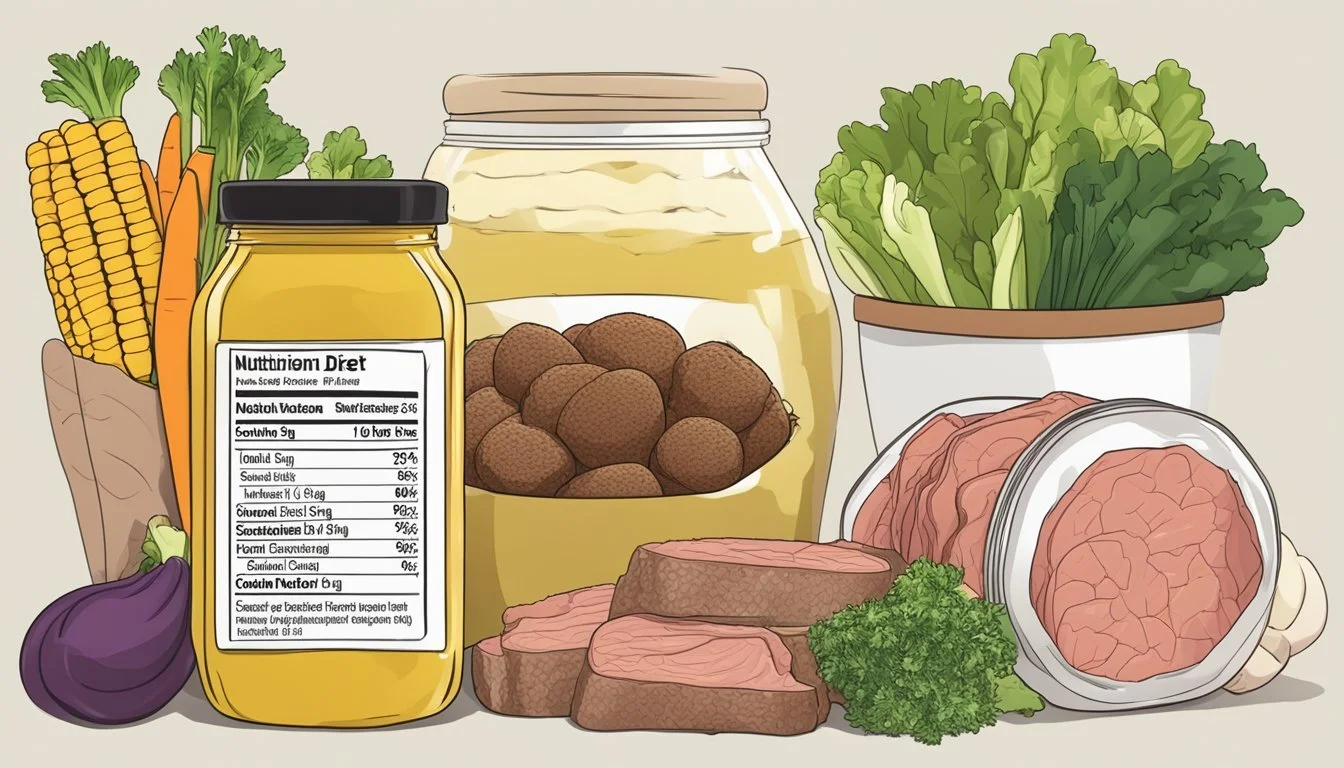Mustard on Carnivore Diet
Condiment Compatibility and Health Impact
The carnivore diet has been gaining traction among those seeking a radical return to a more ancestral way of eating, focusing solely on animal products and excluding plant-based foods. This diet emphasizes the consumption of meat, fish, eggs, and certain dairy products, rejecting the typical inclusion of fruits, vegetables, grains, and nuts. Adherents believe that this way of eating aligns more closely with human evolutionary nutrition and may offer health benefits. Within such a restrictive framework, the conversation often turns to what, if any, additional items can be included to enhance flavor without compromising the principles of the diet.
Mustard is a condiment that comes into question within the carnivore community, as the diet's strict guidelines eliminate most traditional seasonings and sauces. Mustard, which is derived from the seeds of the mustard plant mixed with various other ingredients, presents a potential exception. Many varieties of mustard, especially yellow mustard, are sugar-free, which aligns them more closely with carnivore diet standards when compared to other condiments that commonly contain sugars and other additives. The minimalist nature of certain mustard recipes, which can consist of little more than mustard seeds, water, vinegar, and salt, makes it a suitable option for those on the carnivore diet who are looking for ways to add flavor without deviating from the diet's core values.
Basics of the Carnivore Diet
The carnivore diet simplifies nutrition by focusing solely on animal products, emphasizing a high intake of protein and fats while excluding plant-based foods.
What Constitutes a Carnivore Diet?
The cornerstone of the carnivore diet is the consumption of animal products. This includes:
Meat: Ideally from various animals including beef, pork, lamb, and game meat.
Fish: A good source of omega-3 fatty acids, essential for cardiovascular health.
Eggs: High in protein and vital nutrients such as vitamins A, D, and B-complex.
Dairy: Select dairy products, particularly those low in lactose, like butter and certain cheeses.
Animal fats: Such as lard and tallow, for cooking and additional calorie intake.
Adherents avoid all plant-based foods, focusing instead on the nutrients provided by animal sources.
When it comes to lard or tallow, online shopping is the way to go!
Health Benefits of Carnivore Diet
The carnivore diet is prized for its potential health benefits, which advocates claim to include:
Enhanced weight loss due to high levels of protein promoting satiety.
Provision of essential nutrients, minerals (such as iron, zinc), and vitamins (including vitamin B12) directly from animal products.
The inclusion of fatty acids and fat-soluble vitamins which may support a healthy immune system.
Potential Challenges and Considerations
Despite possible benefits, individuals may encounter challenges on the carnivore diet, such as:
Ensuring a full spectrum of nutrients: Relying solely on animal products could lead to deficiencies if not properly managed.
Electrolyte balance: Strict carnivore dieters need to be mindful of maintaining electrolyte levels as plant sources of these are excluded.
Societal and culinary navigation: Daily life and dining out may require more effort to conform to the diet's restrictions.
Individuals must critically assess their health goals and needs when considering the carnivore diet.
Understanding Mustard in Context
Evaluating mustard's role in a carnivore diet requires examining its ingredients, potential health impacts, and culinary compatibility.
Mustard Varieties and Ingredients
Mustard, a condiment that can be found in various forms, is made primarily from mustard seeds, vinegar, salt, and a blend of spices. Sugar may be present in certain varieties, affecting their compatibility with a carnivore diet. For example, classic yellow mustard is often sugar-free and includes turmeric for color. In contrast, some Dijon mustards may contain minimal additives but remain low in carbs and sugars, with an emphasis on flavor derived naturally from the mustard seeds and wine vinegar.
Potential Health Impacts of Mustard
One must consider the nutritional values of mustard, which are generally low in fat and calories. However, they can include hidden ingredients like preservatives or added sugars, which could have unforeseen health implications. Sugar-free mustard options can align well with the high-protein, high-fat focus of the carnivore diet, as they do not significantly alter overall fat intake.
Culinary Uses of Mustard on Carnivore Diet
Mustard may serve as an optional addition for those seeking to diversify flavors within the confines of the carnivore diet. It can be used sparingly to enhance the taste of animal-based foods without significantly altering the diet's fundamental principles—focusing on meat and animal products. Seasonings and condiments like sugar-free mustards present an opportunity for culinary creativity while maintaining adherence to the diet's guidelines.
Meat and Mustard Pairings
The harmonious pairing of mustard with various meats can accentuate the flavors of both the condiment and the protein. The type of meat and mustard chosen will determine the overall taste experience.
Selecting Meats for Different Mustards
Yellow Mustard: Ideal for simplistic and classic meat pairings. This variety is usually a great match for chicken and bacon, thanks to its mild flavor.
Chicken (grilled or roasted) + Yellow Mustard = A classic combination.
Bacon + Yellow Mustard = Enhances the smokiness of the bacon.
Dijon Mustard: Characterized by a tangy and more pronounced flavor, Dijon mustard complements ruminant meats like steaks well.
Steaks + Dijon Mustard = Brings out the richness of the meat.
Spicy Mustard: Its bold flavor pairs perfectly with rich ruminant meats.
Ruminant Meats (e.g., beef) + Spicy Mustard = Elevates the meat's flavor without overpowering it.
Honey Mustard: A sweet twist that works nicely with bacon and milder tasting meats.
Bacon + Honey Mustard = Balances the sweetness and saltiness.
Seafood: Lighter mustards with a hint of acidity can complement seafood without masking its delicate flavors.
Seafood + Light Dijon or Yellow Mustard = Accentuates the seafood’s taste.
Homemade Condiments and Sauces
Homemade Mustard: One can tailor the taste to complement specific meats such as steaks and seafood. Homemade mustard allows for control over sweetness, tanginess, and spice levels.
Steaks: A coarse, wine-infused homemade mustard can add a gourmet touch.
Seafood: A milder homemade mustard with dill or lemon zest can enhance the dish.
Homemade BBQ Sauce: While not strictly carnivore, a sauce made without sugar can be sparingly used for those wanting a barbecue flavor.
Meat: A touch of homemade BBQ sauce can impart a smoky flavor to various meats without deviating far from the carnivore diet principles.
Homemade Sour Cream and Mayo: These can serve as bases for creating creamy mustard sauces that pair excellently with meats.
Steaks: Sour cream or mayo mixed with mustard can create a rich, creamy sauce.
Chicken: A mustard-infused mayo gives a refreshing twist.
Conscientious Condiment Usage
When adopting a carnivore diet, selecting condiments requires a discerning approach to ensure they align with the dietary framework. This involves scrutinizing labels for non-compliant ingredients and considering homemade alternatives.
Analyzing Condiment Labels
Mustard, as a condiment, generally fits within the carnivore diet when it is sugar-free and devoid of non-animal additives. One must carefully inspect labels for added sugar or plant-based ingredients that could compromise the diet's stringent animal-based focus. Typically, condiments like ketchup, ranch dressing, and cheese sauce often contain sugars and additives, making them less suitable.
A carnivore-friendly condiment list might look like this:
Mustard: Look for versions with minimal ingredients; vinegar and spices are often acceptable.
Hot Sauce: Check for sugar and fruit-based additives; pure chili and vinegar types are preferred.
Mayonnaise: Homemade mayonnaise can be carnivore-compliant using eggs and animal fats instead of vegetable oils.
Fish Sauce: An ideal seasoning option, provided it doesn't contain sugar or other plant derivatives.
Butter: Pure butter is a permissible addition, delivering flavor without compromising the diet.
In comparison, a condiment to avoid might be:
Ketchup: Often laden with high-fructose corn syrup and other sugars, making it unsuitable.
Creating Carnivore-Friendly Condiments
For those who prefer and are willing to make their own condiments, a few adjustments can make a variety of sauces diet-compliant. Utilizing ingredients like dairy products, fresh herbs, and lemon juice can enhance flavors while adhering to the carnivore ethos. Homemade sour cream, for example, can serve as a base for a variety of sauces and dressings. Incorporating seasonings such as herbs and spices—while not strictly animal-derived—can be allowed in minimal amounts for flavor. It is crucial for one to choose condiments that elevate the taste of their food without introducing prohibited elements.
Incorporating Fats and Oils
In the carnivore diet, the choice of fats and oils plays a pivotal role in both flavor and nutrition. It is essential to choose sources that align with the diet's emphasis on animal-based nutrients without introducing unwanted plant-based elements.
Understanding the Role of Fats in Carnivore Diet
Fats are a fundamental component of the carnivore diet and serve multiple purposes, from energy provision to the absorption of fat-soluble vitamins. In this dietary pattern, one relies predominantly on animal fats such as butter, tallow, ghee, and lard, which are considered to be more compatible with the human physiology than plant-derived fats. Animal fats generally contain higher levels of saturated fats, associated with stable energy levels and potentially supporting overall health when consumed as part of a well-managed carnivore diet.
Sensible Selection of Oils and Fats
When incorporating oils and fats into a carnivore diet, individuals should make selections based on the source and processing of these products. Preferably, choosing fats with minimal processing is recommended:
Butter and ghee are excellent for cooking and add flavor to dishes, with ghee being suitable for those sensitive to dairy proteins.
Tallow and lard are rendered fats from beef and pork, respectively, and are ideal for high-temperature cooking.
Animal fats are highly valued in the carnivore diet for their nutrient profile and cooking properties.
It is advisable to avoid seed oils and vegetable oils, including canola oil, due to their high polyunsaturated fat content and potential for oxidation, which may not align with the carnivorous approach to nutrition. These oils are often heavily processed and can introduce elements that diverge from the diet's principles.
Trust me, the easiest way to buy ghee is through online retailers!
Mustard and Diet Adaptation
In considering the role of mustard within a carnivore diet, one's approach to dietary adherence and the condiment's compatibility with animal-based foods are paramount.
Adjusting to Mustard on a Strict Carnivore Diet
On a strict carnivore diet, individuals consume exclusively animal-based foods. This includes meat, organs, eggs, and certain dairy products like cheese and heavy cream. As these dieters prioritize fat and protein intake while minimizing carb consumption, mustard's role requires scrutinous examination. Mustard, made from mustard seeds, vinegar, and spices, contains some plant-based ingredients, but in such trace amounts that they often don't significantly alter the macronutrient profile of the diet. Nonetheless, strict adherence discourages all plant derivatives, indicating that dieters should consider individual tolerance and goals when incorporating mustard.
How Mustard Complements a Carnivore Diet
Despite being plant-derived, mustard can complement a carnivore diet for several reasons. It is low in carbohydrates and absent of added sugars, aligning well with the diet's macronutrient framework. It can also enhance the palatability of meats without displacing the central role of animal-based foods. Moderation is key; mustard should be consumed in small quantities to preserve the diet's integrity. Carnivore-friendly mustard varieties are sugar-free and should be free from additives. Here is how mustard fits within the diet's macronutrient spectrum:
Carnivore Diet Alignment with Mustard
Food Category: Condiments
Carnivore Diet Alignment:
Fat and Protein: Primary Focus
Carbohydrates: Minimal to None
Plant Derivatives: Avoided
Mustard Adaptation:
Impact: Minimal
Carbohydrates: Low to None, varies by type
Plant Derivatives: Present, use in moderation
Accompaniments and Alternatives
Mustard remains a popular choice for those on a carnivore diet, but there are other accompaniments and alternative condiments that can be used to enhance the flavor of carnivore diet meals.
Carnivore Diet-Friendly Sides
Individuals on the carnivore diet have a selective range of side options that complement the meat-centric approach. Eggs and bacon sprinkles serve as excellent side choices that add both texture and flavor. Eggs can be prepared in various forms, such as scrambled or deviled eggs, while bacon can be cooked until crisp and used as a sprinkle over dishes for added crunch.
Bone Marrow: A nutritious side that can be spread over steaks or eaten on its own.
Meat Stock: Can be sipped as a drink or used as a base for soups and stews, enhancing hydration and nutrient intake.
Exploring Alternatives to Mustard and Condiments
While mustard is acceptable on a carnivore diet, one may consider alternatives that align with dietary restrictions. Yogurt, particularly high-fat and low-carb versions, can make for a creamy dressing or a marinade base. As for spices, options like pepper and sea salt are simple yet effective ways to season meat without adding non-animal products.
Condiments derived from animal foods such as homemade butter or mayonnaise made with quality animal fats can also be incorporated. These alternatives adhere to the strict nature of the carnivore diet, ensuring that the integrity of the diet is maintained without the incorporation of sugars, additives, or plant-based ingredients.
Detailed FAQs
Navigating the inclusion of condiments like mustard on the carnivore diet raises specific concerns about sugars, additives, and maintaining the diet's strict focus on animal-based foods.
Addressing Common Questions
Can one consume mustard on the carnivore diet?
Yes, individuals can include mustard in their carnivore diet. It is seen as an optional item due to its minimal plant-based content.
Is the plant-based ingredient in mustard a concern for carnivore dieters?
Mustard seeds, the primary plant-based component of mustard, are used in such small amounts that they are typically not a concern. However, dieters are advised to remain cautious of any added sugars or non-carnivorous ingredients.
What nutritional constituents does mustard contain?
Mustard primarily consists of negligible amounts of proteins, carbohydrates, and fats. It is mostly known for its flavor rather than its nutritional contribution.
Does mustard contain sugars that could affect the carnivore diet?
Most yellow mustard varieties are sugar-free, making them suitable for the carnivore diet. Dieters should check labels to ensure no added sugars are present.
Are there specific types of mustard that are recommended for the carnivore diet?
Dijon and yellow mustard are generally acceptable, assuming they do not contain added sugars or significant quantities of non-animal derived ingredients.
How does mustard fit into the overall macronutrient focus of the carnivore diet?
Since mustard contains trivial amounts of proteins, carbohydrates, and fats, it does not significantly alter the macronutrient profile of a carnivore diet.
Is it important to check condiment labels while on a carnivore diet?
Absolutely. Individuals should diligently read labels to ensure condiments like mustard are free from sugars, additives, and unwanted plant-based ingredients.
Nutritional Information and Resources
The inclusion of mustard in a carnivore diet raises questions about its nutritional components and their compliance with the diet's guidelines. Here, a closer look at mustard's nutritional makeup is considered, along with directions for further resources and studies on the subject.
Analyzing Mustard's Nutritional Composition
Mustard, as a condiment, is known for being low in sugars and carbohydrates. It is primarily made from ground mustard seeds, water, vinegar, and salt. A typical tablespoon of yellow mustard contains about:
Calories: 3
Total Fat: 0.2g
Carbohydrates: 0.5g
Sugars: 0.2g
Sodium: 56mg
Magnesium: Small amounts
Given these values, mustard is seen as a negligible source of calories and carbohydrates, which aligns well with the carnivore diet's restriction on carbs. Furthermore, the trace amounts of magnesium in mustard could offer a slight nutritional benefit, as magnesium is an essential mineral for many bodily functions.
It should be noted, however, that not all mustards are created equal. Dijon and flavored mustards may contain added sugars or other non-animal ingredients, so carnivore dieters should opt for plain mustards and check the labels carefully.
Further Reading and Studies
Individuals following a carnivore diet often seek out scientific evidence to support their food choices. Although extensive studies specifically on mustard within the context of a carnivore diet are limited, there are resources that discuss the condiment's general health benefits.
For those interested in the scientific exploration of mustard's effects on health, reputable sources such as nutrition journals and dietetic associations offer detailed studies. These resources often delve into aspects such as the bioactive compounds found in mustard seeds and the potential antioxidant properties they may hold. Such information can be valuable to ensure that one's carnivore diet is not only sustainable but also nutritionally sound.
Readers are encouraged to tap into these resources, focusing on peer-reviewed articles and evidence-based studies, to make informed decisions about incorporating condiments like mustard into their carnivore diet.











